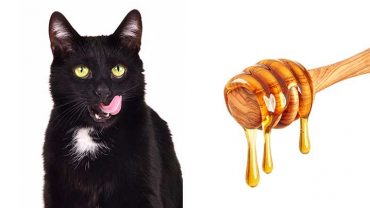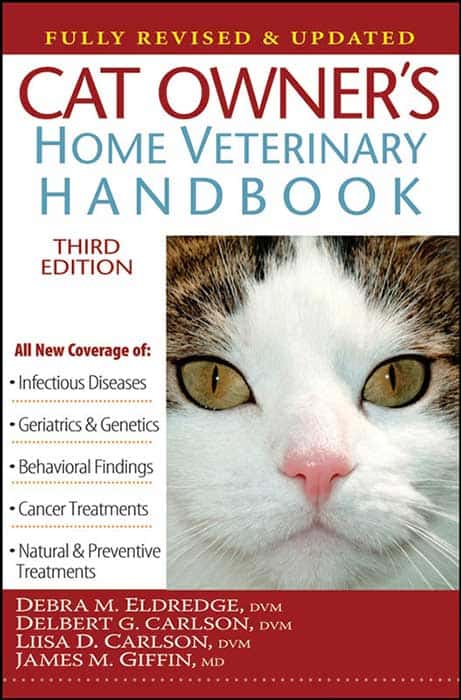A cat meowing and begging for human food isn’t an uncommon sight. And neither is the sight of their human owners happily offering them some human snacks.
Indeed, cats are not new to human foods. However, it’s not like our furry little friends prefer our foods to theirs. In most cases, it all has to do with sheer feline curiosity.
But as you may already know, not every human delicacy is fit for a cat’s consumption. Take the case of honey, for instance. And you may be wondering, can cats eat honey?
The short and plain answer is yes, cats can have honey. Generally, honey isn’t toxic to cats, and will unlikely cause any severe health complications. However, most vets tend to discourage pet parents from serving honey to their cats. That’s mostly because the stickiness of honey is likely to blow your cat away, and the cat might sneak behind your back and help itself to more honey than it shouldn’t.
The good news, though, is that cats typically dislike honey, and will naturally try to avoid it. But to be on the safe side, remember the conventional wisdom when it comes to most human foods for cats. That even if the food is virtually harmless, only give it to the cat only occasionally, either as a treat or for medical for purposes.
Table of Contents
Can I Give My Cat Honey? An In-depth Look at Potential Benefits
Like most pet parents, perhaps you frequently ask yourself, is honey safe for cats? One way to address that question is to highlight the numerous health benefits of honey.
The following are some of the possible ways your cat could benefit from eating honey;
1. Can Help Suppress Coughs
One of the potential health benefits of honey is its cough-relieving abilities. Just like humans, cats may develop inflammation or irritation in their airway, usually due to an allergic reaction or an upper respiratory infection.
A cough significantly interferes with your kitto’s circadian rhythms and general quality of life. It’s easy to prescribe conventional medications, but most of these drugs will only leave your cat with many side effects.
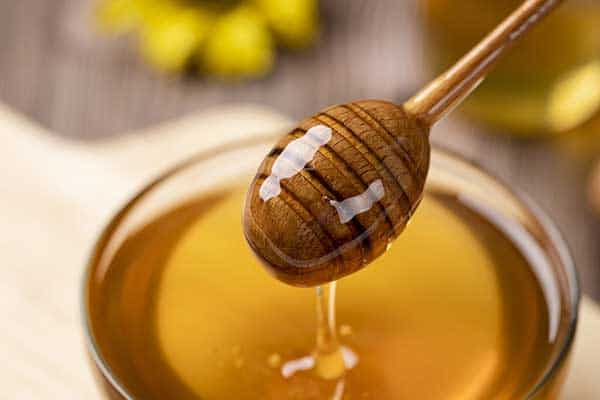
According to one study, honey isn’t only more effective than mainstream cough medications, but it also improves the quality of sleep and doesn’t carry any serious side effects.
? But while honey is a potent relief for feline sore throat, ensure the cat is really suffering from a sore throat and not a scratchy throat. A scratchy throat is common, and will usually go away on its own.
2. Boosts a Cat’s Immunity
This is arguably the fundamental reason why you should consider offering honey to your cat. High-quality raw honey boasts numerous antioxidants. Examples include organic acids as well as phenolic compounds like flavonoids. Antioxidants boost your cat’s immunity in numerous ways.
First, they lower blood pressure, thereby reducing the risks of feline heart disease. To make that happen, the antioxidants cause the cat’s arteries to dilate, which increases the flow of blood to the heart. Buckwheat is an excellent type of honey to try out if you’re seeking to tame blood pressure spikes in your feline friend.
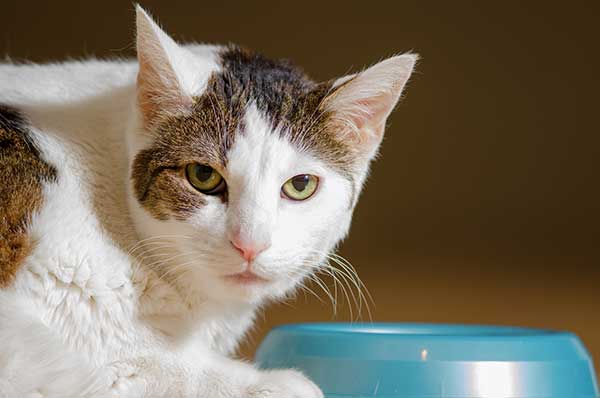
Researchers have also uncovered honey’s ability to lower high LDL cholesterol level. Again, this is instrumental in reducing the risks of heart disease.
High LDL cholesterol plays a significant role in atherosclerosis, which is the buildup of fat in the arteries, leading to blockage of blood vessels, thereby compromising the heart’s functionality. Honey not only reduces total and “bad” LDL cholesterol, but it also raises the “good” HDL cholesterol, thereby delivering compounded benefits in terms of cholesterol regulation.
Besides regulating blood pressure and cholesterol levels, the antioxidants in honey also reduce the risks of strokes, blood clot formation, and heart attacks, all of which are also risk factors for heart disease.
Other diseases that honey might help to keep at bay include diabetes, inflammation in the intestinal tract, stomach ulcers, some types of cancers, and eye conditions.
3. Promotes the Healing of Wounds
Topical honey has been a commonly-recommended home remedy used for healing burns and wounds from time immemorial, especially among ancient Egyptians. That’s mostly due to its richness in anti-inflammatory and antibacterial properties that help nourish the wounded tissue.
And according to research, you can use honey to heal partial-thickness wounds and burns, especially those that become infected after surgery.
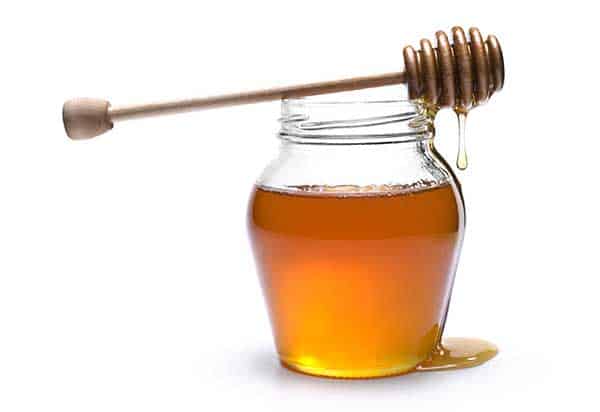
Besides wound healing, you could also prescribe honey for diabetic cats, especially if the cat is suffering from diabetic foot ulcers.
Remember, this is a debilitating condition whose next best cure is amputation. You wouldn’t want to subject your furry, little one to the agony of limping the rest of its life, would you?
? When looking for the best honey for wound healing, always consider Manuka honey. Other possible uses of topical honey include the healing of herpes lesions and psoriasis.
4. Relief from Allergy
It’s almost impossible to discuss cats and honey without making reference to allergies. Allergic cats can benefit a lot from raw honey. Raw honey contains local pollens that have been shown to help boost feline tolerance to seasonal allergies.
Most seasonal allergies happen due to changes in weather, residence, or foods. Therefore, they’re fairly easy to detect.
So, if you’re a cat owner and you’ve possibly been wondering to yourself, can sick cats eat honey? The answer is yes, particularly if the sickness ties back to an allergic reaction.
5. Stomach Ache and Loss of Appetite
Lastly, honey is an excellent remedy for stomach ache and loss of appetite. It soothes a cat’s stomach, thereby relieving stomach ache. Honey also makes the cat’s food taste better, and is great for cats that have low appetite.
? However, note that you cannot prescribe honey for constipation. That’s because it contains close to zero fibers and will not help your cat’s bowel movement. The kinds of pain that honey treats are the localized irritations in a cat’s stomach.
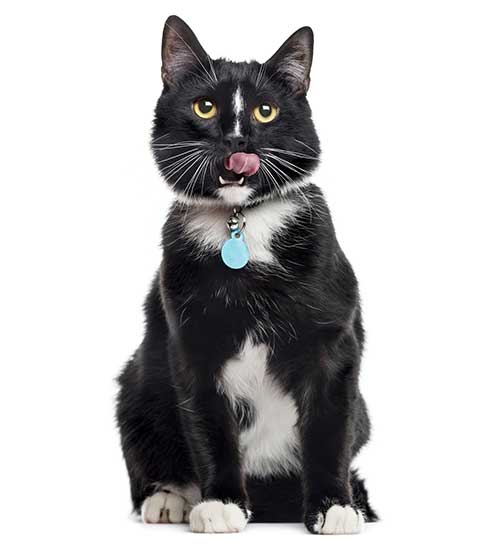
Also, while prescribing honey as an appetite booster, you may not always succeed, as cats are fussy eaters. If you can find better alternatives, that would be great.
So, evidently, honey comes with numerous medical and dietary benefits for cats. And while most research studies were conducted on humans and rats, researchers agree that the findings can be extrapolated to nearly all mammals, including cats. But as you shall find out later on, honey may not be great for your cat in all circumstances.
Which Honey Is Best For My Cat?
We’ve already investigated some of the potential benefits of honey. However, like most foods, we have processed and unprocessed honey, also known as raw honey.
You’ll identify raw honey by its thick and milky appearance. Processed honey may take any appearance, depending on the number or nature of the additives and chemicals that were used to treat it.
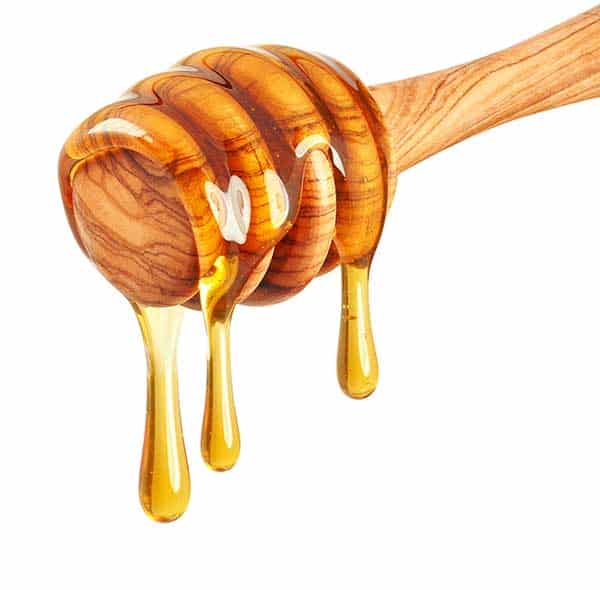 ? Experts generally discourage prescribing processed honey to your cat, and for good reasons. In the course of manufacturing processed honey, it’s usually subjected through ultra-high temperature conditions. The heat destroys all the essential elements in the honey, that would have otherwise been very useful for your cat, such as the pollen. And besides destroying all the vital elements, high temperatures might also introduce other harmful compounds in the honey, making it even more toxic.
? Experts generally discourage prescribing processed honey to your cat, and for good reasons. In the course of manufacturing processed honey, it’s usually subjected through ultra-high temperature conditions. The heat destroys all the essential elements in the honey, that would have otherwise been very useful for your cat, such as the pollen. And besides destroying all the vital elements, high temperatures might also introduce other harmful compounds in the honey, making it even more toxic.
The only benefit processed honey may have over raw honey is its enhanced taste. But even then, the artificial flavors and sweeteners used to improve its taste could also wreak havoc on your cat’s digestive system. That makes processed honey potentially harmful to cats, whichever way you look at it.
So, can cats eat raw honey? Yes, your best bet is to prescribe only raw honey to your cat and if you can, go for Manuka honey. The good news, however, is that raw honey is readily available.
What of honey mixed with other foods?
Well, you may be wondering, can cats eat honey ham?
While ham is nutritious, it’s normally high in salt, which could lead to sodium poisoning in cats.
What of yogurt, can I give yogurt with honey to my cat?
Yogurt packs a lot of sugars, lactose, and artificial sweeteners, all of which a cat shouldn’t eat.
And lastly, can cats eat honey nut cheerios?
You can feed your cat honey nut cheerios. Just ensure you don’t add milk since adult cats are highly lactose-intolerant.
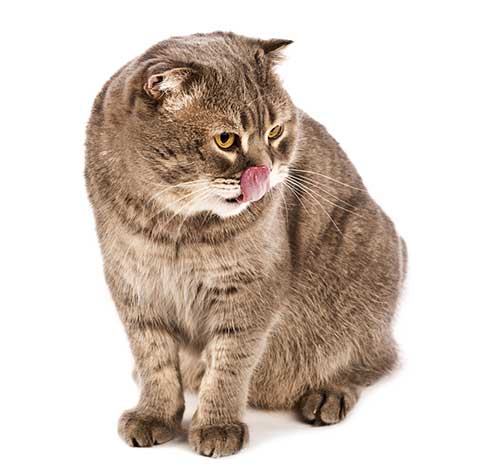
How Much Honey Can Cats Eat?
Having understood the benefits of honey, you may be wondering to yourself, how much honey should I give to my cat?
There’s no hard and fast rule on the quantity of honey you should offer your cat. It mostly depends on the reason you’re feeding honey to the cat, as well as the size of the cat.
For medical reasons, you should seek the counsel of your vet and stick to the recommended doses. But for other reasons like boosting the cat’s appetite, you can experiment with smaller doses and work your way up till you achieve the desired results.
? If you’re ever in doubt, stick to a maximum of 1 teaspoon per day for smaller cats and a maximum of 1 tablespoon per day for larger cats. Again, you want to start small, especially if feeding honey to the cat for the first time. Before increasing the doses, observe for allergic reactions, such as vomiting and diarrhea.
When Should I Give My Cat Honey?
First, you should only give honey to your cat occasionally, either as a treat or health supplement. Generally, resort to honey when you suspect that the cat is sick.
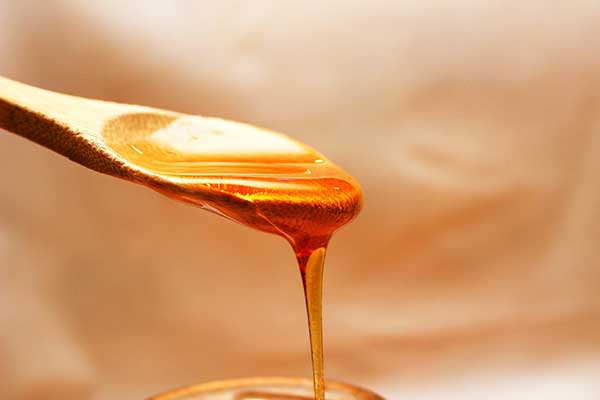
So, can cats eat honey when they are sick?
They sure can. One of the nagging questions most pet parents ask themselves is, is honey good for sick cats?
As we pointed out much earlier, there is a broad spectrum of infections that honey can cure. And here, we’re not referring to full-blown diseases, such as cancer, arthritis, or heart disease. With these ones, you would need to have the cat examined further and only offer it honey upon the recommendations of a qualified vet.
? But for minor infections like sore throat and respiratory inflammations, honey can be a handy home remedy. Its antibacterial and antioxidant properties kick in, relieving these conditions without presenting any further side effects. A sore throat is easy to diagnose at home, as it manifests in cold-like symptoms.
However, if there isn’t any progress even after a few doses of honey, you may consider visiting your vet for further diagnosis.
Another situation where you might administer honey to your cat is if the cat suffers an allergic reaction. Feline allergies are mostly caused by changes in weather, food, or environment. Watch out for symptoms, such as cough, irritability, teary eyes, and nose, etc. Then, administer a few drops of raw honey and monitor the cat’s progress.
What Could Go Wrong If A Cat Eats Honey?
The following are some of the potential dangers of feeding honey to cats.
1. Digestive issues
As a cat’s stomach isn’t used to digesting honey, the cat may experience pains. Remember that even humans have a hard time digesting honey, and it could be worse with your feline friend whose digestive system is much smaller.
2. Difficulty in swallowing
Cats have smaller mouths and throats which may not readily swallow sticky foods. When honey lingers in their throats for much longer, it could present risks of choking as well as cause irritations. An excellent approach here would be to dilute the honey with warm water before offering it to the cat.
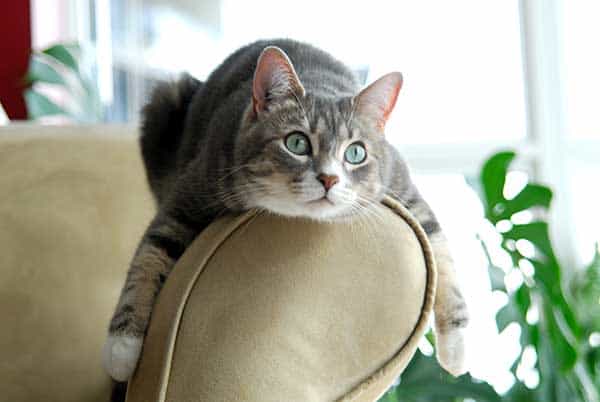
3. Not ideal for diabetic cats
The sweetness of honey may be useful for cats that are battling with poor appetite. However, it may not be so useful for diabetic cats. If you suspect your cat is diabetic, never feed it honey without a vet’s prescription.
The same goes for overweight cats. As one tablespoon of honey packs 64 calories, giving honey to an obese cat may only exacerbate their condition.
3. Risks of botulinum
Honey contains bacteria that may lead to botulism. Though the condition is extremely rare, the risks are still there, especially among kittens whose immune systems aren’t fully developed.
The bacteria is highly neurotoxic and if ingested, may cause permanent paralysis. Symptoms of weakness begin from the hind legs before advancing to the spine and neck, ultimately culminating in full paralysis.
4. Allergic reactions
Honey is a potent cure for feline allergies. So, you may be wondering why it again appears as a potential trigger for the very allergies it’s supposed to cure. The logic here is simple – any foreign substance presents the risks of allergic reactions.
Also, the fact that cats are obligate carnivores means any food other than animal protein has the potential for causing allergies. That underscores the significance of giving tiny amounts of honey to your cat if you’re introducing the cat to honey for the first time.
So, Is Honey Bad For Cats?
Not necessarily. For the most part, honey is good for cats as it doesn’t carry any active toxins. However, honey could turn harmful if you offer it to your cat in uncontrolled portions.
Also, always seek professional advice from your vet before giving honey to your cat, especially if you intend to do it routinely.

